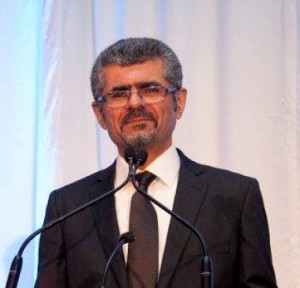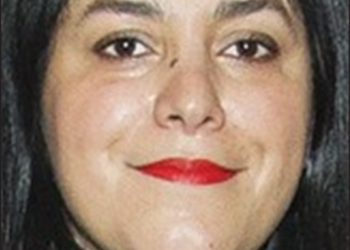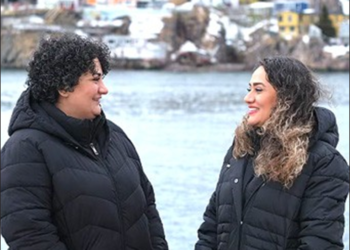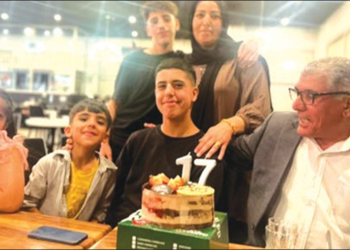May 13, 2016

An Iranian-Canadian physician wanted for child abduction has surfaced in Iran with all four of his children.
Dr. Saren Azer and his children are living in Maha-bad in Kurdistan province, Canada’s National Post reported last week.
Azer, an Iranian Kurd, does not appear to be concerned about the international warrant issued for his arrest; he recently attended the public funeral of a retired university director in Mahabad. The event was also attended by top Iranian-Kurdish officials, including a member of the Majlis. Azer was featured prominently in photographs published by a local media outlet, the Post reported.
Mahabad is Azer’s home city and where his mother, four brothers and four sisters live.
The Canadian government has been aware that Azer has been living in Mahabad for at least a month, sources told the Post.

Azer’s former wife, Alison, has been frantically searching for her children: daughters Sharvahn, 11, and Rojevahn, 9; and sons Dersim, 7, and Meitan, 3. Last August, the Royal Canadian Mounted Police (RCMP), Canada’s national police force, issued an arrest warrant for Saren Azer on charges of abduction after he failed to return from a trip to Europe with the children.
The family lived in the small town of Comox, British Columbia, on Vancouver Island.
The abduction of the Azer children has sparked debate in the House of Commons and prompted vigils across Canada. Last Wednesday, a vigil was held in Montreal, with those attending calling on the federal government to take action to get the Canadian youngsters back. Another vigil is to be held in Vancouver May 7.
As the case has gathered more and more attention across Canada, Prime Minister Justin Trudeau has said the return of the children is a priority for his government.
After Saren Azer left Europe, he first took the children to a village in Kurdistan in Iraq, just kilometers away from ongoing fighting there, the Post said.
Alison Azer said she has received emails from residents in Mahabad, informing her the children have been seen in public and that they are under the care of her former husband’s mother, Aysheh Pendareh, and two of his sisters, Shahla Mahmudi-Azer and Maheen Mahmudi-Azer.
“Saren is trying to integrate into Iranian society,” Alison told the Post.
She told CTV it appears the children are safe in Mahabad, but she said the family there does not speak English and she is worried they must feel helpless and alone.
“They spent five months in a war zone that was absolutely bleak and remote. Now they’re at least in a city where there are other family members.” But she said, “I think these children are traumatized and terrified and have no idea what’s going on.”
Saren Azer’s return to Iran raises new questions about his refugee claim that prompted Canada to award him citizenship. After arriving in Canada in 1994, Azer denounced the Iranian government and claimed his life would be in danger if he were ever to return to that country. Azer also claimed to have been tortured by the Iranian government.
Alison Azer said she was initially shocked to find out her former husband had returned to Iran. “He came to Canada claiming political asylum and telling the Canadian government that his life was at risk in Iran because of his Kurdish political views,” she said. “He said he could never go back there.”
The Canadian Security Intelligence Service (CSIS), Canada’s intelligence agency, warned the government not to grant Saren citizenship, saying he was linked to the Kurdistan Workers’ Party (PKK), which is listed as a terrorist organization by the United States, Canada and Turkey. Iran has sometimes helped and sometimes hindered the PKK, depending on the status of its relations with Turkey.
CSIS was overruled as a campaign supported by university professors, human rights activists and some politicians successfully urged Canada to grant Azer citizenship.
Alison also questioned how her former husband slipped across the Iraq-Iran border. She noted that the Kurdish Regional Government in Iraq, which had been informed about the abduction, assured Canadian diplomats its troops patrolled that area and it was secure. Canada is providing millions of dollars worth of aid, weapons and military training to the Kurds in northern Iraq.
Mahabad, a city of 280,000, is heavily Kurdish. Iranian forces have been battling Kurdish guerrillas in the region for decades.
Alison Azer said she originally admired and supported her ex-husband’s efforts to help Kurdish refugees. But the two separated more than three years ago after Saren talked about moving the family to the Middle East and having the children accompany him to war zones. Alison said he also became increasingly strident in his views regarding Islam.
Saren Azer was legally permitted to leave Canada with the children on a trip to Europe. But, when he didn’t return, the courts granted full custody of the children to Alison and the warrant was issued for his arrest.
Saren Azer was prominent in Canada’s Kurdish community. Last year, he was featured in one of Prime Minister Stephen Harper’s videos on Canada’s involvement in the Iraq war.
In a video posted on Harper’s website April 1, 2015, Azer praised the Conservative government for extending Canada’s military mission in Iraq. He also met with Harper in his office.
Azer also met with then Conservative Defense Minister Jason Kenney, who lauded Azer as a man “doing tremendous work” with Canada’s Kurdish community to help Iraqi refugees. But after the disappearance of the children, the Conservative government, which lost election to Trudeau last year, distanced itself from Azer.


















